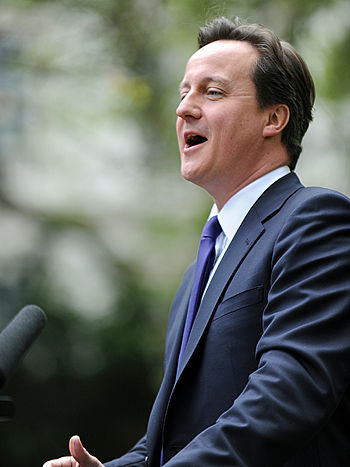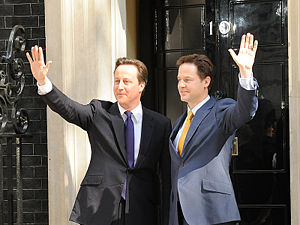David Cameron: Difference between revisions
imported>Peter Jackson |
imported>Peter Jackson No edit summary |
||
| Line 1: | Line 1: | ||
{{subpages}} | {{subpages}} | ||
{{Image|David-cameron-2010.jpg|right|350px|David Cameron has been [[Conservative Party (UK)|Conservative Party]] leader since 2005 and [[Prime Minister of the United Kingdom]] since May 2010.}} | {{Image|David-cameron-2010.jpg|right|350px|David Cameron has been [[Conservative Party (UK)|Conservative Party]] leader since 2005 and [[Prime Minister of the United Kingdom]] since May 2010.}} | ||
'''David Cameron''' (born 9th October 1966) has been the [[Prime Minister of the United Kingdom]] since May 2010, and leader of the [[Conservative Party (UK)|Conservative Party]] since 2005. Cameron's Conservative Party became the largest party in the [[2010 United Kingdom general election|2010 general election]] but did not enough seats to form a majority government. The party formed a coalition with [[Nick Clegg]]'s [[Liberal Democrats (UK)|Liberal Democrats]] in order to form a stable majority [[coalition government|coalition]].<ref>''BBC News'': ' [http://news.bbc.co.uk/1/hi/uk_politics/election_2010/8676607.stm David Cameron's coalition government sets to work]'. 12 May 2010.</ref> In the [[2015 United Kingdom general election]] the Conservatives won an outright majority and the Liberal Democrat ministers resigned to be replaced by Conservatives. | '''David Cameron''' (born 9th October 1966) has been the [[Prime Minister of the United Kingdom]] since May 2010, and leader of the [[Conservative Party (UK)|Conservative Party]] since 2005. Cameron's Conservative Party became the largest party in the [[2010 United Kingdom general election|2010 general election]] but did not enough seats to form a majority government. The party formed a coalition with [[Nick Clegg]]'s [[Liberal Democrats (UK)|Liberal Democrats]] in order to form a stable majority [[coalition government|coalition]].<ref>''BBC News'': ' [http://news.bbc.co.uk/1/hi/uk_politics/election_2010/8676607.stm David Cameron's coalition government sets to work]'. 12 May 2010.</ref> In the [[2015 United Kingdom general election]] the Conservatives won an outright majority and the Liberal Democrat ministers resigned to be replaced by Conservatives. On 24 June 2015, after losing the [[UK referendum on EU membership]], he announced he would resign as Prime Minister in a few months' time. | ||
As a [[Member of Parliament (UK)|Member of Parliament]] he has represented the constituency of [[Witney]] in the [[House of Commons]] since May 2001; in 2005, on becoming Conservative leader. he took up the post of [[Leader of the Opposition (UK)|Leader of the Opposition]]. Cameron had previously been a researcher and special adviser for the party, and was Director of Communications for [[Carlton Communications]] for seven years. He is married with two children; his eldest son, Ivan, died in 2009. The Camerons announced in 2010 that they were expecting a fourth child that year. | As a [[Member of Parliament (UK)|Member of Parliament]] he has represented the constituency of [[Witney]] in the [[House of Commons]] since May 2001; in 2005, on becoming Conservative leader. he took up the post of [[Leader of the Opposition (UK)|Leader of the Opposition]]. Cameron had previously been a researcher and special adviser for the party, and was Director of Communications for [[Carlton Communications]] for seven years. He is married with two children; his eldest son, Ivan, died in 2009. The Camerons announced in 2010 that they were expecting a fourth child that year. | ||
Revision as of 03:33, 25 June 2016

David Cameron has been Conservative Party leader since 2005 and Prime Minister of the United Kingdom since May 2010.
David Cameron (born 9th October 1966) has been the Prime Minister of the United Kingdom since May 2010, and leader of the Conservative Party since 2005. Cameron's Conservative Party became the largest party in the 2010 general election but did not enough seats to form a majority government. The party formed a coalition with Nick Clegg's Liberal Democrats in order to form a stable majority coalition.[1] In the 2015 United Kingdom general election the Conservatives won an outright majority and the Liberal Democrat ministers resigned to be replaced by Conservatives. On 24 June 2015, after losing the UK referendum on EU membership, he announced he would resign as Prime Minister in a few months' time.
As a Member of Parliament he has represented the constituency of Witney in the House of Commons since May 2001; in 2005, on becoming Conservative leader. he took up the post of Leader of the Opposition. Cameron had previously been a researcher and special adviser for the party, and was Director of Communications for Carlton Communications for seven years. He is married with two children; his eldest son, Ivan, died in 2009. The Camerons announced in 2010 that they were expecting a fourth child that year.
Early life, career and family
Cameron was born in 1966 to Ian Cameron, a stockbroker, and Mary Cameron, a Justice of the Peace for 30 years. Before attending Eton, the top public school in Windsor, Cameron attended Heatherdown, an exclusive prep school. Having gotten three A's at A-level in history, history of art and economics with politics, Cameron headed for Oxford University to gain a first in politics, philosophy and economics ("PPE"). During a gap year before university, he worked for the Conservative MP Tim Rathbone. At university, he was - along with Conservative London mayor and former MP Boris Johnson - a member of the Bullingdon Club, an invitation-only exclusive dining club which was satirised by Evelyn Waugh in Brideshead Revisited and Decline and Fall.[2]
Cameron is married to Samantha Cameron and they have three children - Nancy, Arthur and Florence. The Camerons also had a son, Ivan, who died at age six from cerebral palsy in February of 2009. This tragic death has been said by some commentators to have helped Cameron's image, making him more human and less "toff".[3]
Leader of the Conservative Party, 2005-
In 2005, Michael Howard, the Home Secretary under John Major, ran against Tony Blair's Labour Party on the Conservative ticket but lost. Following this defeat, he resigned as leader of the Conservative Party and made way for a lengthy leadership contest. [4] Cameron was involved in formulating the 2005 Conservative manifesto.
Cameron was elected as the leader of the Conservative Party against David Davis, a more traditional Conservative candidate but with a strong civil libertarian streak, as well as Ken Clarke and Liam Fox. Cameron rejected a number of standard Conservative policies: he stated that he was for the then recently introduced same-sex civil partnerships and started talking up his support for green policies on climate change, recycling and the environment. The slogan "vote blue, go green" was used by the party to highlight this new position on climate change. Similarly, Cameron has tried to get the support of the gay community - not supportive of Conservatives especially since the passing of Section 28 during the Thatcher years - meeting with Peter Tatchell, giving interviews to gay magazines, pledging support for anti-homophobia campaigns and selecting a number of openly gay candidates.[5][6]
Cameron coalition government, 2010–2015

David Cameron pictured with Deputy Prime Minister Nick Clegg shortly after taking office in May 2010.
See also: Conservative-Liberal Democratic coalition government (2010)
Cameron failed to win a working majority in the 2010 UK general election, and thus the automatic right to form a government, but was able to establish a formal coalition with the Liberal Democrats, the third-placed party in Parliament. Cameron appointed its leader Nick Clegg as Deputy Prime Minister.
The coalition agreement between the Conservatives and Liberal Democrats committed the two parties to work together on a number of measures including deficit reduction, banking and financial sector reform, 'free schools' and academies reform, a "Freedom Bill" to reverse purported erosions of civil liberties and environmental reforms. The agreement also included a number of areas where Liberal Democrats were allowed to abstain: the building of new nuclear power plants, for instance. The process works by allowing a Liberal Democrat spokesmen to make a statement against a particular policy, and then Liberal Democrat MPs abstaining from the vote. In the case of the referendum on the Alternative Vote system - which the Liberal Democrats are for and the Conservatives are against - they both agreed to have the referendum, and the Conservatives campaigned against it and the Liberal Democrats for it; of course, the public got to choose in the end.[7]
Footnotes
- ↑ BBC News: ' David Cameron's coalition government sets to work'. 12 May 2010.
- ↑ BBC News, David Cameron: Life and times of new UK Prime Minister, 11 May 2010
- ↑ John F. Burns, Son’s Death Recasts Image of a British Leader, New York Times, February 25, 2009.
- ↑ BBC News, Howard to stand down as leader, 6 May, 2005
- ↑ SameSame, New Brit. PM 'believs in gay equality'
- ↑ PinkNews, Exclusive: David Cameron on Gay Rights as he answers questions from PinkNews.co.uk readers.
- ↑ Liberal Democrats website, Conservative Liberal Democrat coalition agreements, 12 May 2010.